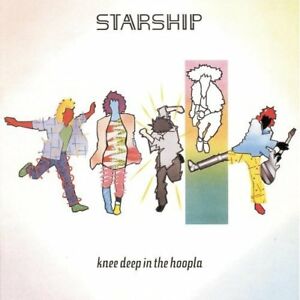
Knee Deep in the Hoopla is the debut studio album by American AOR band Starship, the succeeding musical project to Jefferson Starship. It was released on September 10, 1985, through record label Grunt.
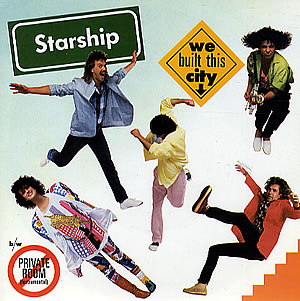
"We Built This City" is the debut single by American rock band Starship, from their 1985 debut album Knee Deep in the Hoopla. It was written by English musicians Martin Page and Bernie Taupin, who were both living in Los Angeles at the time, and was originally intended as a lament against the closure of many of that city's live music clubs.

"Kyrie" is a song by American pop rock band Mr. Mister, from their album Welcome to the Real World. Released around Christmas in 1985, it hit the top spot on the Billboard Hot 100 in March 1986, where it was number 1 for two weeks. It also hit the top spot on the Billboard Top Rock Tracks chart for one week. In the UK, the song peaked at number 11 in March 1986.
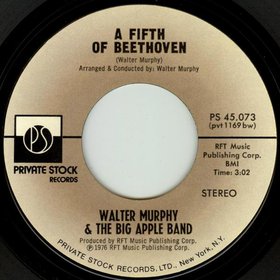
"A Fifth of Beethoven" is a disco instrumental recorded by Walter Murphy and the Big Apple Band, adapted from the first movement of Ludwig van Beethoven's Symphony No. 5. The record was produced by production music and sound effects recording producer Thomas J. Valentino. The "Fifth" in the song's title is a pun, referencing a liquid measure approximately equal to one-fifth of a gallon, a popular size for bottles containing liquor, as well as Beethoven's Fifth Symphony from which the song was adapted.

"On My Own" is a duet by American singers Patti LaBelle and Michael McDonald. It was written and produced by Burt Bacharach and his then-wife Carole Bayer Sager and originally recorded by singer Dionne Warwick for inclusion on her album Friends (1985). The song was eventually recorded by LaBelle and McDonald for her eighth studio album, Winner in You (1986). It was released as the album's lead single on March 22, 1986, by MCA Records. Lyrically, "On My Own" was based on a relationship that had reached its end with both parties going their separate ways in a melancholy state with the occasional option of coming back together again one day.

"When a Man Loves a Woman" is a song written by Calvin Lewis and Andrew Wright and first recorded by Percy Sledge in 1966 at Norala Sound Studio in Sheffield, Alabama. It made number one on both the Billboard Hot 100 and R&B singles charts. Country singer John Wesley Ryles had a minor hit with his version of the song in 1976. Singer and actress Bette Midler recorded the song and had a Top 40 hit with her version in 1980. In 1991, Michael Bolton recorded the song and his version peaked at number one on both the Billboard Hot 100 chart and the Billboard Adult Contemporary Singles chart.

"Easy Lover" is a song performed by Philip Bailey of the band Earth, Wind & Fire and Phil Collins of the band Genesis, jointly written and composed by Bailey, Collins, and Nathan East. The song appears on Bailey's solo album, Chinese Wall. Collins has performed the song in his live concerts, and it appears on both his 1990 album, Serious Hits... Live!, and his 1998 compilation album, ...Hits. It is Bailey's only US Top 40 hit as a solo artist.
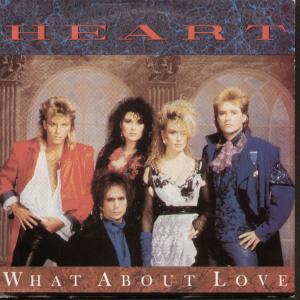
"What About Love" is a song originally recorded by Canadian rock band Toronto in 1982. It was later recorded by American rock band Heart in 1985 and was released as the first single from the band's self-titled album, Heart. The band's "comeback" single, it was the first Heart track to reach the top 40 in three years, and their first top 10 hit in five. The song was also their first hit single on their new record label, Capitol Records. Grace Slick and Mickey Thomas, co-lead vocalists of Starship at the time, provide additional background vocals on the song.

"Broken Wings" is a 1985 song recorded by American pop rock band Mr. Mister. It was released in June 1985 as the lead single from their second album Welcome to the Real World. The song peaked at number one on the Billboard Hot 100 in December 1985, where it remained for two weeks. It was released as the band was just about to embark on a US tour opening for Tina Turner. "Broken Wings" became the first of two consecutive number ones of the band on the American charts, the other chart-topper being "Kyrie". Outside of the United States, "Broken Wings" topped the charts in Canada, peaked within the top ten of the charts in Australia, Belgium (Flanders), the Netherlands, Norway, the Republic of Ireland, Switzerland, the United Kingdom and West Germany, and the top twenty of the charts in Austria, New Zealand, Spain and Sweden.

"How Am I Supposed to Live Without You" is a song co-written in 1982 by Doug James and Michael Bolton. The track was originally recorded by Laura Branigan in 1983, charting at number one in both the US and Canadian Adult Contemporary charts. Bolton later recorded his own version of the song that topped the US Billboard Hot 100 and became a worldwide hit.
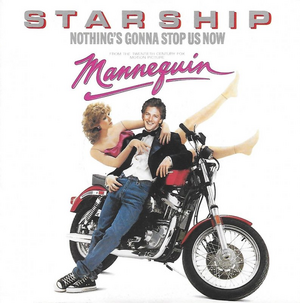
"Nothing's Gonna Stop Us Now" is a song co-written by Diane Warren and Albert Hammond and recorded by American rock band Starship for their second studio album, No Protection (1987). It is a power ballad duet featuring vocalists Grace Slick and Mickey Thomas and is the theme to the romantic-comedy film Mannequin.
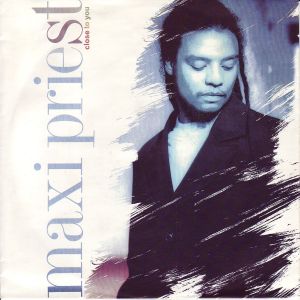
"Close to You" is a song by English reggae singer Maxi Priest. It was released in 1990 as the lead single from his fifth album Bonafide (1990). "Close to You" reached number one on the US Billboard Hot 100, number two on the Australian ARIA Singles Chart, and number seven on the UK Singles Chart.

"If You're Gone" is a song by American rock band Matchbox Twenty. The song, written by the band's frontman Rob Thomas, was released on September 18, 2000, as the second single from their second album, Mad Season (2000). It reached number five on the US Billboard Hot 100 chart, becoming the band's second best-ranking song on the chart, and also became a hit on adult contemporary radio, spending two weeks at number one on the Billboard Hot Adult Contemporary Tracks chart.
"Don't Turn Around" is a popular song written by Albert Hammond and Diane Warren. It was originally recorded by American singer Tina Turner and released as the B-side to her 1986 hit single "Typical Male". It has since been included on Turner's compilation album The Collected Recordings: Sixties to Nineties (1994), as well as featuring in the Tina musical since 2018.

"These Dreams" is a song by American rock band Heart from their 1985 self-titled eighth studio album Heart. It was released on January 18, 1986, as the album's third single, becoming the band's first song to top the Billboard Hot 100. The single's B-side track "Shell Shock", was also the B-side of Heart's previous single "Never".

"Stuck with You" is a song by American rock band Huey Lewis and the News, written by guitarist Chris Hayes and lead singer Huey Lewis. Released in 1986, it was the first single from the band's fourth album, Fore!. The song spent three weeks at number one on the US Billboard Hot 100, becoming the band's second number-one hit on the chart. Internationally, the song became the band's second top-20 hit in the United Kingdom, reaching number 12 on the UK Singles Chart, and peaked within the top 10 in Australia, Canada, Iceland, South Africa, and New Zealand.
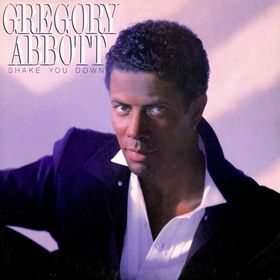
"Shake You Down" is a song by American R&B artist, writer and producer Gregory Abbott. It was released in August 1986 as the lead single from his debut album of the same name. It became Abbott's biggest hit and was certified platinum by the RIAA. The track is also featured in the 2007 film Are We Done Yet?

"There'll Be Sad Songs (To Make You Cry)" is a song by English singer Billy Ocean from his sixth studio album, Love Zone (1986). The song was written and produced by Wayne Brathwaite and Barry Eastmond; Ocean was also credited as a co-writer for the song. The song reached number one on the Billboard Hot 100 for the week beginning 5 July 1986, where it remained for one week, becoming the 600th different song to ascend to that position. It also topped the adult contemporary and R&B charts in the United States that same summer.

"Rhythm of the Night" is a song by American musical recording group DeBarge, written by Diane Warren and released on February 23, 1985, on the Motown label as the first single from their fourth studio album Rhythm of the Night (1985). The song jump-started the career of the prolific songwriter Warren, and was the biggest hit recorded by the Motown family singing group, peaking at number three on the Billboard Hot 100.

"Miracles" is a song written by Marty Balin and originally recorded by Jefferson Starship, appearing on its 1975 album Red Octopus.



















